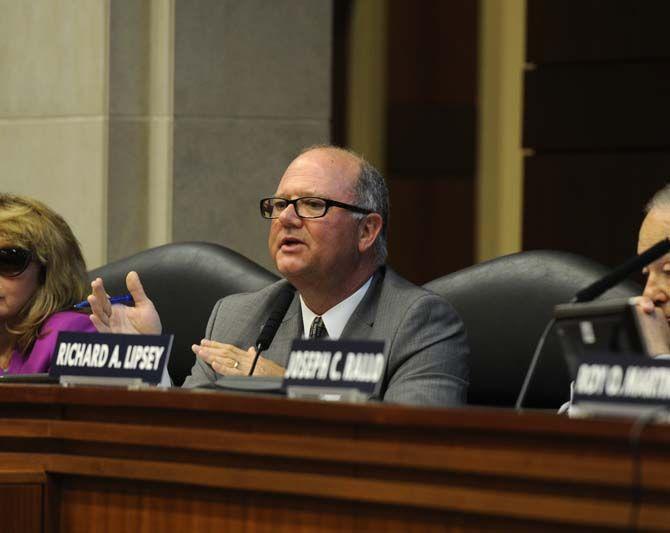The affordable public flagship system will cease to exist in 12 years, according to a personal metrics study presented by LSU President F. King Alexander at a Louisiana Board of Regents hearing Wednesday. LSU’s future has a 2027 expiration date, Alexander said.
The Board sought to address this problem when they crowded in the Claiborne Building on N. Third St. to review and approve the LSU System’s current year budgets.
The LSU system with campuses in Baton Rouge, Shreveport, Eunice and Alexandria experienced a jolt in enrollment this semester with an increase of about 1,000 students. Approximately 600 students enrolled at the main campus, which includes the Paul M. Hebert Law Center.
With student growth system-wide, Alexander said proper funding for various academic programming was crucial for the success of the flagship system.
“We just want to have a predictable budget that allows us steady growth,” Alexander said. “We really need a coherent funding formula.”
However, as student enrollment went up, faculty membership declined.
LSU had a net loss of 222 faculty members, Alexander said, increasing the student-to-faculty ratio from 17:1 to 24:1.
With the addition of about 95 new faculty members hired in 2015, Alexander said each new hire is worth about $140,000 in external support.
Despite the fluctuations in students and faculty, Alexander said out-of-state enrollment has stabilized. He also said, out of 45 flagship universities on a college scorecard, LSU is the sixth most affordable and ranks as one of the schools with the lowest student debt in the country.
He said though these statistics portray the system in a positive light, LSU ranks 46 out of 50 states in the amount of money it is able to spend per student — forcing university administration to make cuts in student program budgets.
To combat the cuts, Alexander said administrators implemented a Academic Excellence Fee, which was tacked on to the 2015-16 academic year tuition. The fee was a 10 percent increase from last year’s tuition, raising it from $2,000 to $2,200.
He said the revenues will be channeled back into the classroom and student programs.
“The use of the fee is going to directly benefit students,” Alexander said.
Alexander said the fee would also help ensure safety at LSU-Eunice, where there are no campus police officers.
The Board also addressed the issue of college affordability, and suggested lowering student costs by adopting an exclusively e-book collection instead of selling traditional textbooks.
While e-books are slowly seeping into Middleton and Barnes & Noble Bookstore, Alexander said students fear massive costs upfront and low return rates later.
“Bookstores don’t rip students off. It’s the publishers,” Alexander said.
Another of Alexander’s solutions for affordability included LOSFA-funded “Go Grants,” which have a $22 million price tag statewide. He said LSU puts $12 million in its own Go Grant to help 5,000 students on the main campus in financial need.
He also said, although students contribute about 80 percent of LSU’s funding, research projects have been put in place in an attempt to increase revenue. Pennington Biomedical Research Center, for example, is collaborating with the main campus to double the state’s oyster production.
Part of the deal would allow Pennington researchers to teach classes at the main campus. Alexander said they hope to develop a sustainable business model.
He said the LSU system will ignore several state-mandated expenditures, including a Hotel Planner Mandate which did not allow athletic coaches to stay in the same hotels as their players.
Alexander said mandated costs for the main campus, at $120,000, exceed the $115,000 LSU receives from the state.
“Our students have been paying for state government,” Alexander said. “That’s the real injustice.”
Board of Regents budget hearing discusses lower costs for prospective students
September 23, 2015
Board of Regents member Joseph C. Wiley shares his views on the maintenance issues, federal grants, and sexual misconduct issues on Wednesday Aug. 26, 2015, in the Claiborne Building in Baton Rouge.
More to Discover









